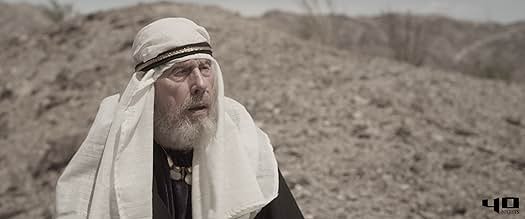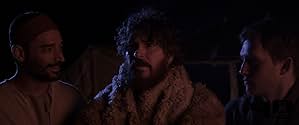- Awards
- 1 win & 3 nominations
Joey Cipriano
- Young Jesus
- (as Joe Cipriano)
- Director
- Writer
- All cast & crew
- Production, box office & more at IMDbPro
Storyline
Did you know
- Trivia"40 Nights" was the last film for iconic 70's TV star Dan "Grizzly Adams" Haggerty as the voice of God.
- GoofsWhile satan is tempting Jesus to turn a stone into bread, tire tracks can be seen to the right in a small open area.
- ConnectionsFollowed by Chasing the Star (2017)
Featured review
According to all four gospels in the Christian New Testament, the primary pivotal time in Jesus' life and ministry was his baptism in the Jordan River by John the Baptist. Before this act, Jesus was just a "face in the crowd" at least outwardly. Possibly he was just another disciple of John, maybe even one so nondescript, he wasn't even worth writing or talking about.
All of this changed when Jesus emerged from the water in John's arms. At this point he had a vision from God. The impact on Jesus was so great , he had to go into the wilderness afterward for 40 days of fasting and praying to help him reflect on and process this experience. What was this vision and its impact on Jesus? The Gospels describe his vision (mainly of a dove descending from heaven) but don't really tell us what was going on in Jesus' mind during this time of radical inward change. What we do know is that after this time was over, Jesus immediately began preaching his (and our) Gospel of love and peace.
So we see this profound outward radicalization of Christ's life but get nothing of his thoughts on the matter, at least from the Gospels. The film "40 Nights" seeks to fill in these gaps during his desert time and speculates on how Jesus realized his calling and decided what to do next. Ingeniously, the film gives us this information by "filling in" Jesus' personal reactions to his subsequent temptations in the desert. The gospels have Jesus react to Satan's temptations by quoting scripture from the Old Testament (the Hebrew Bible). What do these quotes mean in their context? Why is Jesus saying these things? What do these reactions say about Jesus' thoughts and feelings about these "mere" scripture verses? Most importantly, what was Jesus thinking while he wasn't encountering Satan.
The Bible is silent on these questions. For centuries Bible scholars, church leaders and theologians have speculated on these questions (and questioned Jesus' personal reactions to other events in his life). In the tradition of such scholarship, "40 Nights" seeks answer these questions simply, by reasonably speculating on what was going on in his mind during this time. Naturally this film uses visual imagery to portray Jesus' thoughts, focusing on his reaction to Satan's attempts to suborn him. You may agree or disagree with what you see and hear, but the results are both moving and at the same time biblical and revealing. How would you react to such "divine" visions and personal revelations? "40 Nights" shows a plausible interpretation of the human side of Christ, the side most of us can best relate to, including Jesus' astonishment at realizing His true message and, most importantly, who he really is. The film's basic story line shows us Christ's baptism and Jesus' subsequent time in the wilderness. This lonely experience brought Jesus to three profound temptations from "the devil." Christians have interpreted these "visions" variously as either real temptations from a real Satan or as metaphors for his inner thoughts and feelings, or both. "40 Nights" chooses to focus on the metaphorical side of the temptations as Jesus journeys through the desert encountering visions of phony "what do I do next" ideas courtesy of Satan himself.
"40 Nights" did a wonderful job of showing Jesus as human, including flashbacks to Jesus' past. Most Christian movies, literature and teaching never do this. Christ's being the son of God was faithfully rendered but not trumpeted. It's good that the film showed what Jesus experienced personally. Instead of trying to turn this tale into a trite "biblical epic," the film focuses on Jesus' interactions, memories and personal internal battles. I especially liked the film's showing that Jesus' temptation in the wilderness was not just a prologue for his ministry but also part of his preparation for death on the cross. In its symbolism, this film's story shows one man's search for faith and God-given strength while he sets off on a journey of fasting to prepare his soul for sacrifice. Of course some artistic license was taken to fill in gaps not shown in the Bible. But hey, the movie is never as good as the book, right? Still, the film was careful to be faithful to the biblical accounts.
In essence, the film boils down to a personal drama, a character study if you like, seeking to reveal Jesus' internal conflicts and struggles. You will either agree with its portrayal or not, but you cannot argue that it doesn't show reverence for its subject. "40 Nights" is a film that inspires, no matter whether the viewer is believer. In essence, it is a thought-provoking and challenging attempt to glimpse the soul of Christ.
Although the "action" is at times a bit slow, I found that some of these moments actually gave me good personal time to reflect on what the film was actually trying to say. I really enjoyed the landscape and scenic shots. I got a profound sense of the natural ruggedness and spiritual solitude of the desert. Certainly DJ Perry does an excellent job portraying Christ. In addition to being entertaining, "40 Nights" is a good study tool for any church Christian education program. Watch it, think about it and enjoy it. Share it with others. Above all, you can use it as a way to help with your own personal journey in Christ.
All of this changed when Jesus emerged from the water in John's arms. At this point he had a vision from God. The impact on Jesus was so great , he had to go into the wilderness afterward for 40 days of fasting and praying to help him reflect on and process this experience. What was this vision and its impact on Jesus? The Gospels describe his vision (mainly of a dove descending from heaven) but don't really tell us what was going on in Jesus' mind during this time of radical inward change. What we do know is that after this time was over, Jesus immediately began preaching his (and our) Gospel of love and peace.
So we see this profound outward radicalization of Christ's life but get nothing of his thoughts on the matter, at least from the Gospels. The film "40 Nights" seeks to fill in these gaps during his desert time and speculates on how Jesus realized his calling and decided what to do next. Ingeniously, the film gives us this information by "filling in" Jesus' personal reactions to his subsequent temptations in the desert. The gospels have Jesus react to Satan's temptations by quoting scripture from the Old Testament (the Hebrew Bible). What do these quotes mean in their context? Why is Jesus saying these things? What do these reactions say about Jesus' thoughts and feelings about these "mere" scripture verses? Most importantly, what was Jesus thinking while he wasn't encountering Satan.
The Bible is silent on these questions. For centuries Bible scholars, church leaders and theologians have speculated on these questions (and questioned Jesus' personal reactions to other events in his life). In the tradition of such scholarship, "40 Nights" seeks answer these questions simply, by reasonably speculating on what was going on in his mind during this time. Naturally this film uses visual imagery to portray Jesus' thoughts, focusing on his reaction to Satan's attempts to suborn him. You may agree or disagree with what you see and hear, but the results are both moving and at the same time biblical and revealing. How would you react to such "divine" visions and personal revelations? "40 Nights" shows a plausible interpretation of the human side of Christ, the side most of us can best relate to, including Jesus' astonishment at realizing His true message and, most importantly, who he really is. The film's basic story line shows us Christ's baptism and Jesus' subsequent time in the wilderness. This lonely experience brought Jesus to three profound temptations from "the devil." Christians have interpreted these "visions" variously as either real temptations from a real Satan or as metaphors for his inner thoughts and feelings, or both. "40 Nights" chooses to focus on the metaphorical side of the temptations as Jesus journeys through the desert encountering visions of phony "what do I do next" ideas courtesy of Satan himself.
"40 Nights" did a wonderful job of showing Jesus as human, including flashbacks to Jesus' past. Most Christian movies, literature and teaching never do this. Christ's being the son of God was faithfully rendered but not trumpeted. It's good that the film showed what Jesus experienced personally. Instead of trying to turn this tale into a trite "biblical epic," the film focuses on Jesus' interactions, memories and personal internal battles. I especially liked the film's showing that Jesus' temptation in the wilderness was not just a prologue for his ministry but also part of his preparation for death on the cross. In its symbolism, this film's story shows one man's search for faith and God-given strength while he sets off on a journey of fasting to prepare his soul for sacrifice. Of course some artistic license was taken to fill in gaps not shown in the Bible. But hey, the movie is never as good as the book, right? Still, the film was careful to be faithful to the biblical accounts.
In essence, the film boils down to a personal drama, a character study if you like, seeking to reveal Jesus' internal conflicts and struggles. You will either agree with its portrayal or not, but you cannot argue that it doesn't show reverence for its subject. "40 Nights" is a film that inspires, no matter whether the viewer is believer. In essence, it is a thought-provoking and challenging attempt to glimpse the soul of Christ.
Although the "action" is at times a bit slow, I found that some of these moments actually gave me good personal time to reflect on what the film was actually trying to say. I really enjoyed the landscape and scenic shots. I got a profound sense of the natural ruggedness and spiritual solitude of the desert. Certainly DJ Perry does an excellent job portraying Christ. In addition to being entertaining, "40 Nights" is a good study tool for any church Christian education program. Watch it, think about it and enjoy it. Share it with others. Above all, you can use it as a way to help with your own personal journey in Christ.
- russwilliams-2
- Jun 19, 2017
- Permalink
Details
- Runtime1 hour 28 minutes
- Color
Contribute to this page
Suggest an edit or add missing content























